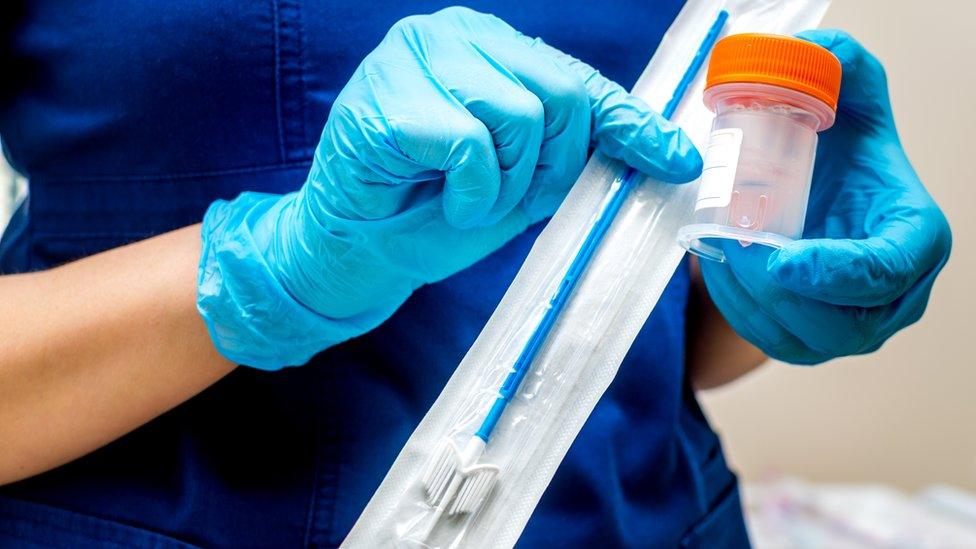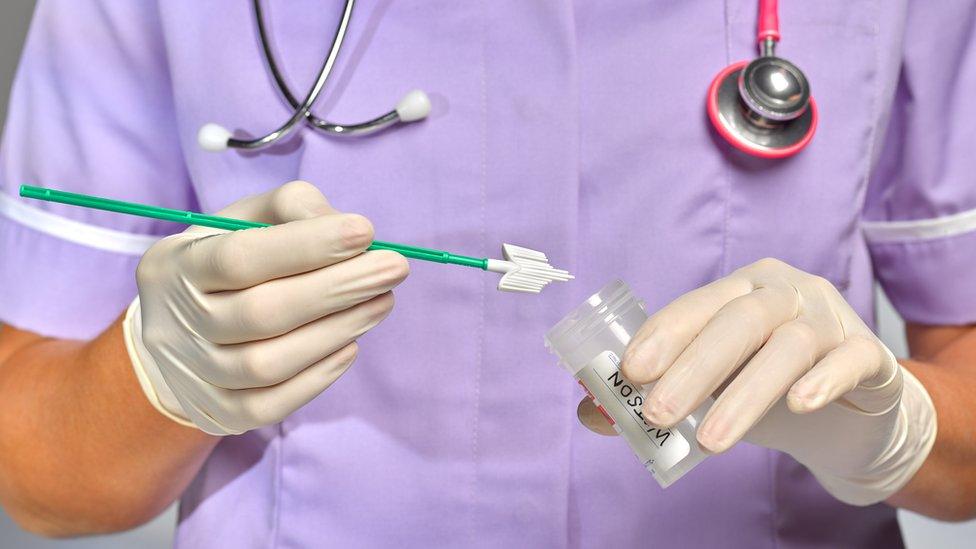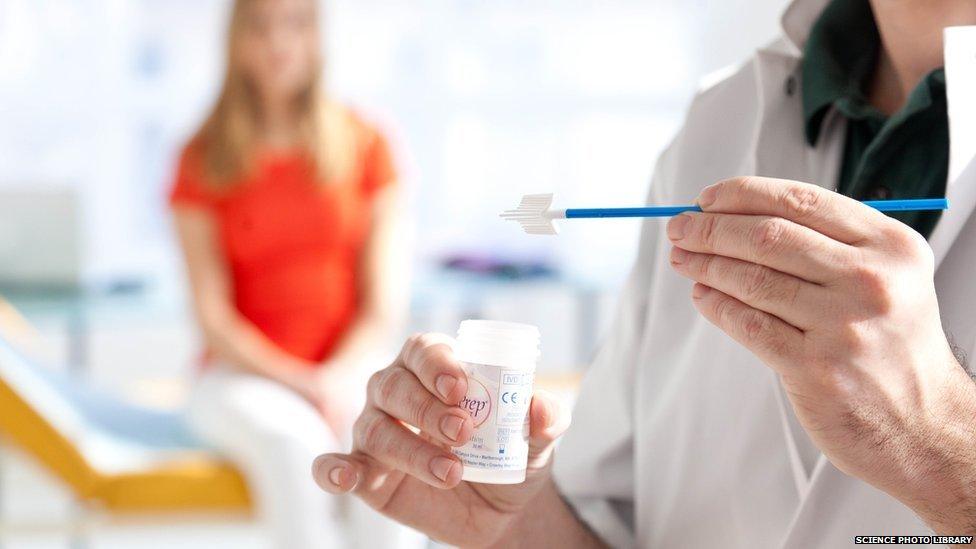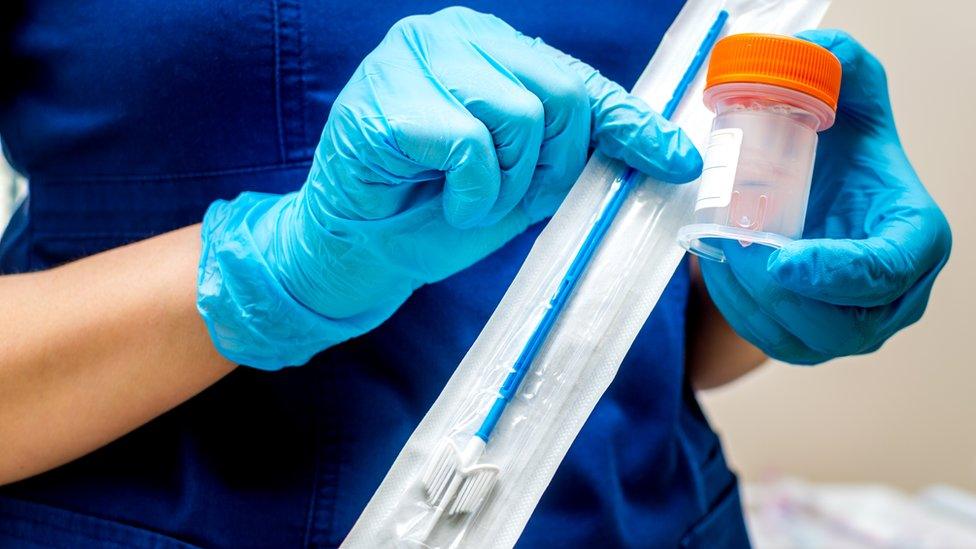Cervical cancer: Northern Ireland urged to adopt HPV testing
- Published

The HPV screening test is used in the rest of the UK and has also been adopted in the Republic of Ireland
The lead investigator in the Republic of Ireland's cervical check screening controversy has said it is awful that Northern Ireland has not adopted HPV (human papillomavirus) testing.
HPV is the cause of most cervical cancers.
The HPV screening test is used in the rest of the UK and has been adopted in the Republic of Ireland.
Dr Gabriel Scally said there could be "no excuse" in Northern Ireland for "lagging behind".
In England, Scotland, and Wales, HPV testing has already replaced cell (cytological) tests, but Northern Ireland has yet to make the switch.
While Stormont's Department of Health has committed to moving to this testing method, without an executive and guaranteed funding there is a question over what happens next.
'More accurate'
Before the HPV test was available, labs could only look for suspicious cells in smear samples that suggested cancer may already be present, or soon could be.
A HPV infection comes before the development of abnormal cells.
"England, Scotland, Wales and the Republic of Ireland all use a new test, a much more accurate test, a test that actually detects the presence of the virus," Dr Scally told BBC News NI's Good Morning Ulster.

Prof Gabriel Scally said there was no excuse for Northern Ireland lagging behind
"If a woman doesn't have the virus, it is very unlikely that she will have a cervical cancer potential problem," he continued.
"All of those screening services in other parts of Britain and Ireland have moved to a system where the first thing that is done on the sample that is taken from the woman is it is tested for the virus.
"Unfortunately, screening is never 100 per cent accurate, there are some missed cases, but the HPV test, the primary screening test, reduces that really dramatically by about 50-60 per cent and that's really important at reducing the overall level of cervical cancer amongst women.
"At the moment, the testing system in Northern Ireland still relies almost 100 per cent on people looking down a microscope and you are making very difficult judgements in a very short period of time and the test is much better.
"It is absolutely awful that the test hasn't been rolled out in Northern Ireland and there can be no excuse for lagging behind, because it means that there will be more missed abnormalities and that creates the potential for cancer developing."
Dr Scally said that Northern Ireland should be moving to eradicate cervical cancer.
"The HPV testing and HPV vaccination for all young people and getting that level of vaccination up as high as possible, those are the two routes to eradicating cervical cancer and that's what the Republic of Ireland has set as their goal.
"They are working very hard to do it."
What happens during a smear test?
Last week, BBC News NI reported that a woman who was diagnosed with cervical cancer had learned that she had three previous abnormal smear tests that were missed.
Susan, not her real name, had to undergo a radical hysterectomy when a test in 2019 revealed cancerous cells.
The 45-year-old said she was devastated at the diagnosis and shocked and upset that previous tests had been misread.
Northern Ireland's Southern and Western health trusts, which were involved in Susan's care, have apologised.
The woman spoke anonymously to BBC News NI health correspondent Marie-Louise Connolly
'Five month wait'
Meanwhile, a former Stormont minister has warned that lives are being put "at risk" because of how long it is taking for women to receive their smear test results.
Claire Sugden said one of her constituents was recently told she would have to wait a minimum of five months.
According to health trust targets, patients should be given smear test results with one month in 80% of cases.
Ms Sugden described recent stories about missed cervical cancer diagnoses as a "travesty".
"The reality is, however, that an arguably broader danger to women's health is the extremely long times that women are having to wait to receive their results," she added.
After hearing Susan's story, BBC News NI found that the Southern Health Trust (SHT) is beginning a review or risk assessment, which will be carried out by the Royal College of Pathology.
The review is expected to take 10 weeks to complete and could affect hundreds of women.
It will attempt to establish if there was a greater chance of missing abnormalities in screening samples in the trust between 2019 and 2021.
The SHT has confirmed that "work involving a number of screening staff will be examined as part of the risk assessment".
2016-2020
81 cases annually(On average)
21 deaths annually(On average)

What is cervical screening?
It aims to prevent cervical cancer - by identifying and treating abnormalities that could develop into cancer if left untreated.
But screening cannot identify every single case of cancer or pre-cancer - it is not a diagnostic test for cancer.
In Northern Ireland, screening is offered to women between the ages of 25 and 64., external

If you have been affected by any of the issues in this story, you can contact the BBC Action Line for support.

- Published7 November 2022

- Published9 February 2023

- Published1 June 2022

- Published1 February 2022

- Published5 March 2019
